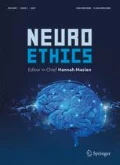Abstract
Pickard’s contribution reminds me that conceptualizing choice is no simple matter. Pickard sees choice as entirely voluntary, while I argue that choice is only partially voluntary. Choices are based on appraisals of situations, which fluctuate due to external circumstances and internal states such as emotion and mood. Habit itself competes with volition, and all these parameters vary with development. Psychological factors such as delay discounting and especially one's belief in one's agency are critical for volitional choice as well.
References
Pickard, Hanna. 2017. Responsibility without blame for addiction. Neuroethics 10. doi:10.1007/s12152-016-9295-2.
Lewis, Marc D. 2017. Addiction and the Brain: Development, not Disease. Neuroethics 10. doi:10.1007/s12152-016-9293-4.
Heather, Nick. 2017. Q: Is addiction a brain disease or a moral failing? A: Neither. Neuroethics 10. doi:10.1007/s12152-016-9289-0.
Libet, Benjamin. 1985. Unconscious cerebral initiative and the role of conscious will in voluntary action. Behavioral and Brain Sciences 8: 529–539. doi:10.1017/S0140525X00044903.
Wegner, Daniel M., and James A.K. Erskine. 2003. Voluntary involuntariness: Thought suppression and the regulation of the experience of will. In Consciousness and Cognition 12: 684–694. doi:10.1016/S1053-8100(03)00054-0.
Lewis, Marc D. 2015. The biology of desire. Why addiction is not a disease. New York: Public Affairs.
Prendergast, Michael, Deborah Podus, John Finney, Lisa Greenwell, and John Roll. 2006. Contingency management for treatment of substance use disorders: A meta-analysis. Addiction. doi:10.1111/j.1360-0443.2006.01581.x.
Satel, Sally L., and Scott O. Lilienfeld. 2017. If addiction is not best conceptualized a brain disease, then what kind of disease is it? Neuroethics 10. Neuroethics. doi:10.1007/s12152-016-9287-2.
Ainslie, George. 2017. Intertemporal bargaining in habit. Neuroethics 10. doi:10.3389/fpsyt.2013.00063.
Author information
Authors and Affiliations
Corresponding author
Rights and permissions
About this article
Cite this article
Lewis, M. Choice Isn’t Simple. Reply to Pickard. Neuroethics 10, 181–183 (2017). https://doi.org/10.1007/s12152-017-9321-z
Received:
Accepted:
Published:
Issue Date:
DOI: https://doi.org/10.1007/s12152-017-9321-z

